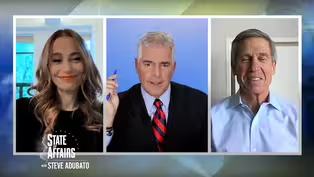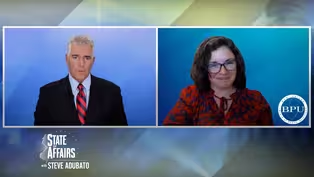State of Affairs with Steve Adubato
The future of polling and key voter issues behind elections
Clip: Season 8 Episode 24 | 9m 55sVideo has Closed Captions
The future of polling and key voter issues behind elections
Steve Adubato is joined by Benjamin Dworkin, Ph.D., Director of the Rowan Institute for Public Policy & Citizenship (RIPPAC), to examine the recent national election, key voter issues behind Republican victories, and the future of political polling.
Problems playing video? | Closed Captioning Feedback
Problems playing video? | Closed Captioning Feedback
State of Affairs with Steve Adubato is a local public television program presented by NJ PBS
State of Affairs with Steve Adubato
The future of polling and key voter issues behind elections
Clip: Season 8 Episode 24 | 9m 55sVideo has Closed Captions
Steve Adubato is joined by Benjamin Dworkin, Ph.D., Director of the Rowan Institute for Public Policy & Citizenship (RIPPAC), to examine the recent national election, key voter issues behind Republican victories, and the future of political polling.
Problems playing video? | Closed Captioning Feedback
How to Watch State of Affairs with Steve Adubato
State of Affairs with Steve Adubato is available to stream on pbs.org and the free PBS App, available on iPhone, Apple TV, Android TV, Android smartphones, Amazon Fire TV, Amazon Fire Tablet, Roku, Samsung Smart TV, and Vizio.
Providing Support for PBS.org
Learn Moreabout PBS online sponsorship[INSPRATIONAL MUSIC STING] - We're joined once again by Dr. Ben Dworkin, who's Director of the Rowan Institute for Public Policy & Citizenship, Rowan University, one of our longtime higher ed partners.
Ben, good to see you.
- Good to see you, Steve.
- All right, this is after the 2024 election, be seen, I don't know, weeks after, months after.
Put it in perspective: the biggest takeaway for you from this historic election is?
- Just the scope of the Trump victory.
It was not just in certain areas; it was pervasive, and that made it significant and stunning.
I mean, most of us were walking into this election thinking that it was a tied race, and it clearly was something different.
So there are questions that are coming forward for our polling, for our, as people look at how campaign strategy is designed based on that polling.
Because I don't think anybody really expected this kind of large-scale red wave across the country.
- You mentioned polls.
Ben, I would be remiss if I didn't ask you and put this on the table: I mean, these polls are so wrong so often; and if policy decisions are made, or perception of where people are or are not on candidates, on issues are so off, why the heck are we still doing polling if polls are crappy so often?
- Well, they're not always crappy.
- No, they're not always, but they're off.
- But that's why you still use them is my point.
You know, it's not everyone is bad.
But clearly a whole bunch of them were off in this election.
Trump is a unique candidate when it comes to polling.
People don't respond.
People don't want to participate.
Pollsters over the last, I mean, we've seen this off since 2016.
Pollsters have tried to make accommodations to deal with it.
Clearly, the polling community really hasn't found a proper formula for polling when Donald Trump is on the ticket.
- That being said, how much of this, from your perspective, Ben, you understand public policy better than most, how much of this election was and is a rejection of the public policy agenda of the Biden-Harris administration?
- I think it's a significant part.
But there's a big caveat here.
You know, the straw that breaks the camel's back is as heavy as every other straw.
There's never one thing that will make the difference in a campaign.
And so we're gonna have to look at a lot of different things.
Certainly, what we're beginning to see as post-election analyses come out is that there clearly was a rejection on the Biden administration.
Kamala Harris tried to turn the page, but she was turning the page in effect on herself because she was part of it.
And she went out on "The View" and other places and said I couldn't tell you where I would change anything in terms of what we did.
So that's part of it.
But there are probably several other issues that we might not have, we don't quite understand just yet.
And that's gonna come over the next few months.
- From a public policy perspective, President Trump talks about mass deportation on day one; excuse me, an extension of the 2017 tax cuts for wealthier Americans and corporations.
He talks about a range of issues, and also including wind energy, turbines, let's do away with them.
The federal government's not gonna fund it anymore.
What's realistic in terms of what he's gonna be able to do with Congress, and how much is he gonna just do by executive order, Ben?
- I think he's gonna try and do everything by executive order.
It's certainly the easiest and most efficient way to impose a certain policy.
Congress is gonna be difficult.
Even if the Republicans win the House, it's gonna be very close.
And it's hard to put together, as we saw over the last couple of years, it's hard for the Republicans to put together a working majority.
Now, Donald Trump being in the White House will make a difference, and certainly he'll be able to, because of his command of the Republican Party, he'll be able to work to impose his will on any legislator who might be hesitant to do something.
But I think it'll be harder.
So we're gonna expect a lot more of the executive orders.
And they will cover a range of policies that he's articulated and thrown out there.
We'll have to see which one comes first, but it's gonna be a flurry in those first 100 days.
- Ben, do you believe that the 2024 election winds up having a significant impact on the 2025 race for governor of New Jersey, in this sense, that because President Trump only lost New Jersey by five percentage points, many polls had him winning by way more than 10, up to 12, 14, 16 percentage points.
Question, do you think a more quote MAGA/Trump-oriented Republican candidate has a better chance of getting the Republican nomination today than before the November 5th election?
- Yes.
And there's more to that, but just to focus on that specific question, yes, the more MAGA candidate in New Jersey's Republican Party I think has a better shot, simply because there's a national endorsement of Donald Trump.
He won this election.
You know, 140 million people, Americans went out to vote in a free and fair and nonviolent election, and one side won.
And I think that is going to inspire people who believe in Trumpism, who believe in Donald Trump, who want to emulate his type of politics and his type of policy agenda: so yes.
- But that's in a primary, Ben.
That's in a Republican primary.
- Yeah.
- Sorry for interrupting.
Do you have any sense of a general election, how much different the electorate is in New Jersey today than it was a year ago?
- In a general election, I'm not sure that the Trump agenda, someone trying to be more MAGA than the others.
If they win the primary, I'm not sure that person is going to win the general or be competitive in the general election.
The fact is, Kamala Harris won.
She won by five points.
Winning is winning.
- In New Jersey.
- In New Jersey, yes.
And, you know, winning is winning.
I think in a year from now, when we go to the polls for a general election for governor, we're gonna be looking at a year's worth of the Trump administration.
If the past is any kind of prologue, then what we're looking at is a sharp reaction against the incumbent, against an incumbent White House, whomever is in the White House.
People are gonna react against that.
We're gonna be in a very different political environment as we head into the fall of 2025.
- Before I let you go, Ben, how much soul-searching do you think the Democratic Party needs to do to be more competitive moving forward?
- Oh, I think it's gonna be huge.
And it needs to be.
There needs to be confrontation among different parts of the party.
And not everyone's gonna be happy with it.
And people are gonna crumble.
- Hard conversations, Ben?
- Really hard conversations.
Hard conversations about Israel and Gaza.
Hard conversations about the economy.
Hard conversations- - Immigration.
- About immigration.
Exactly.
And so all of this is going to... What we did have in immigration, for example, the knee-jerk reaction, we're gonna be a sanctuary state, we're gonna be a sanctuary city.
Well, once a lot of migrants started coming to those cities, the people who live in those cities and those states started reacting very negatively.
So it's not just a talking point that people could throw out there.
The party's gonna have to have, do a lot of soul-searching right now.
But we've seen this before, Steve, and parties come back.
- Ben Dworkin knows more about politics and public policy and citizenship than most folks, so pay attention.
Dr. Ben Dworkin from Rowan University, our longtime higher ed partner.
Good to see you, my friend.
Thank you.
Appreciate it.
- Thank you, Steve.
- I'm Steve Adubato.
That is Professor Dworkin.
See you next time.
- [Narrator] State of Affairs with Steve Adubato is a production of the Caucus Educational Corporation.
Celebrating 30 years in public broadcasting.
Funding has been provided by PSE&G, Holy Name.
Robert Wood Johnson Foundation.
Johnson & Johnson.
New Jersey Sharing Network.
New Brunswick Development Corporation.
Delta Dental of New Jersey.
Community FoodBank of New Jersey.
And by NJM Insurance Group.
Promotional support provided by New Jersey Globe.
And by NJBIZ.
- (Narrator) Since 1903, PSEG has worked to keep our commitment to customers and communities, to keep your lights on and homes warm.
We’re there when challenges strike like storms or economic uncertainty.
We're preparing for tomorrow by working to replace aging infrastructure, provide carbon free nuclear energy, and deliver energy efficient options to customers.
PSEG, powering progress.
The impact of the new Trump administration’s policies
Video has Closed Captions
Clip: S8 Ep24 | 10m 56s | The impact of the new Trump administration’s policies (10m 56s)
President of NJ BPU addresses clean energy in NJ
Video has Closed Captions
Clip: S8 Ep24 | 7m 45s | President of NJ BPU addresses clean energy in NJ (7m 45s)
Providing Support for PBS.org
Learn Moreabout PBS online sponsorship
- News and Public Affairs

Top journalists deliver compelling original analysis of the hour's headlines.

- News and Public Affairs

FRONTLINE is investigative journalism that questions, explains and changes our world.












Support for PBS provided by:
State of Affairs with Steve Adubato is a local public television program presented by NJ PBS

